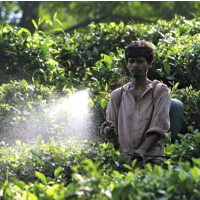Greenpeace Report on Pesticides in Tea Spurs Brands to Action
 A farmer spraying pesticide on tea leaves (photo: AP)
A farmer spraying pesticide on tea leaves (photo: AP)
Two weeks have passed since a report by Greenpeace India that shows a high level of pesticides found in tea packaged in India, yet little effort appears to have been made by the government to tackle the long-term problem of pesticide use in tea plantations. Tea industry bodies have dismissed the report, but individual companies are exploring alternatives to pesticides.
Greenpeace has analysed leading national and international tea brands, and found most of them to contain pesticides considered highly and moderately hazardous by the World Health Organization (WHO). The study also reveals the presence of other pesticides that have reportedly not been approved for use on tea crops in India.
"Indian tea is a national pride, and it should not be the one linked to toxic chemicals with serious environmental and health risks. All stakeholders in the tea industry should come forward and take steps to safeguard the reputation of our national drink," said Neha Saigal, Senior Campaigner, Greenpeace India, when launching the report.
Between June 2013 and May 2014, the environmental activist group tested a sample of 49 branded packaged teas from 8 of the top 11 companies that dominate the branded tea market in India as well as export to the US, UK, UAE, Russia and Iran. These brands included Hindustan Unilever, Tata Global Beverages, Wagh Bakri Tea, Goodricke Tea, Twinings, Golden Tips, Kho-Cha and Girnar.
A large number of these samples allegedly tested positive for a cocktail of toxic pesticides, including DDT that present in almost 67 per cent of the tea samples even though it was banned for use in agriculture in 1989.
The Greenpeace report has been dismissed by the tea industry, with the Consultative Committee of Plantation Association and the Tea Board declaring that Indian tea is already subjected to some of the most stringent standards globally.
According to Greenpeace, the only way out of the ‘pesticide treadmill’ is ecological farming. The NGO called on companies to adopt a time-bound roadmap starting with pilots to phase out pesticides in their supply chains and replace them with ecological agriculture methods.
Two companies responded to Greenpeace’s request: Unilever and Girnar Tea agreed to undertake pilots to create a roadmap for non-pesticide management in tea production.
Three Tata companies, Tata Chemicals, Tata Global Beverages and Rallis, simultaneously announced an initiative – Sustainable Plant Protection Formulation Project – to develop and implement ecological solutions for the protection of tea plants. However, Tata said it would continue to follow the conventional method, by combining biological means with chemical control measures.
Meanwhile, the Greenpeace report has already alarmed other countries. With Indian tea being consumed in Bhutan, Kuensel reported that the Bhutan Agriculture and Regulatory Food Authority (BAFRA) will conduct tests on the tea available in the market.
Much clearly needs to be done to restore the credibility of Indian tea. Pesticide-free plantations need to be identified and certified by the industry, and over the medium term the pilots started by Unilever and Girnar need to become the norm.
If non-pesticide management is not implemented immediately across the industry, stringent testing by the Western countries could kill the export market for Indian tea. And that would be a deathblow for the one million people who work in this industry and the 6 million who depend on it indirectly for their livelihood.
To Learn More:
Trouble Brewing: Pesticide residues in tea samples from India (full report by Greenpeace India)
Tea trade, industry close ranks to take on Greenpeace report (by Indrani Dutta, The Hindu)
Tea companies commit to non-pesticide management in tea (by Chittaranjan Tembhekar, The Times of India)
- Top Stories
- Controversies
- Where is the Money Going?
- India and the World
- Appointments and Resignations
- Unusual News
- Latest News
- India College Chain’s Expansion into U.S. Draws Opposition from Massachusetts Officials over Quality of Education
- Milk Shortages in India Tied to Release of New Movies Featuring Nation’s Favorite Stars
- Confusion Swirls around Kashmir Newspaper Ban in Wake of Violent Street Protests
- Polio-Free for 5 Years, India Launches Vaccine Drive after Polio Strain Discovery
- New Aviation Policy Could Increase Service, Lower Ticket Prices






Comments